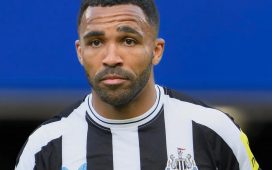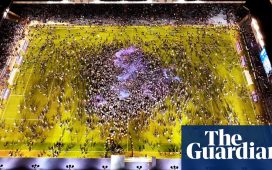One of the clearest memories Reiss Nelson holds of the day he made his Arsenal debut comes from its aftermath, when the intense satisfaction had given way to a fuzzy glow. He had barely played five minutes as a substitute in the 2017 Community Shield against Chelsea, but Wembley was hardly an inadequate launchpad for a 17-year-old’s career. His older brother, Ricky, knew the achievement’s scale better than anyone and, to both siblings, it felt at once like a moment of attainment and one of departure.
“He said to me: ‘Reiss, I think you’re on the way to the top now so I can kind of leave you be; you know what you want to do,’” Nelson remembers. For years Ricky had made a mission of keeping Reiss’s focus on football, which was no easy task for anyone growing up in south-east London’s Aylesbury estate. You needed talent to come this far, but also the right role models on hand. “Without him,” he says, “I don’t know if I’d be here today doing the good things I’m doing for Arsenal.”
The last two and a half years have not been straightforward but Nelson feels ready to make those positive contributions regularly now. His ability has rarely been in question: it captivated most who crossed his path during childhood and made such an impression on Mikel Arteta, during the now-manager’s playing days at Arsenal, that he paid special attention to the winger’s progress long after moving to Manchester City. But at senior level it has been confined to flashes and there has always been the temptation, albeit a simplistic one, to compare his fortunes with the dazzling form shown at Borussia Dortmund by his close friend Jadon Sancho.
He is used to people confecting competitions between the two. Nelson and Sancho grew up little more than five minutes apart, in Walworth and Kennington respectively, and there came a point where the double act’s abilities with the ball brought mildly irritating consequences.
“It was always: ‘Reiss and Jadon, who’s better?’ or ‘Reiss and Jadon, play football’, and it was getting a bit annoying and boring for us,” he says. “We’d be out, like in a nice place, and someone would just throw a ball and say: ‘These two, battle each other!’ It got to a point where we were both just like: ‘Nah, we can’t just go messing around with each other all the time.’ It’s more of a proper brotherhood – he’s like my brother. It’s not a battle like some people say.”
The real fight was to stay on the right path. Aylesbury estate has been the subject of numerous documentaries, think pieces and regeneration schemes; it was where Tony Blair made his first major speech as prime minister in 1997, using its backdrop to symbolise the “forgotten people” he vowed to raise from deprivation. As Nelson puts it: “There was nothing really going good round there” during his youth; he was fortunate to have organised football, and training sessions with Arsenal from the age of eight, as an outlet but that was no guarantee things would end well.

“A lot of my best friends were doing the wrong stuff, got caught up in the wrong stuff, and there were top, top footballers,” he says. “There was even one kid who was at Arsenal with me, then he went on the wrong path and unfortunately he isn’t doing that any more. It’s hard, and hard for me to see that as well, because there are so many talented kids out there.”
The most common pitfalls would be “drugs or involvement in gangs”. It is easy to say Nelson, who appears bright and engaged, would literally have kept his eye on the ball, but he constantly returns to the influences of Ricky, who is a full decade his senior, and his sister, Tessa. Both were youth workers and, after school, he would visit one or the other if there was no football training.
“One hundred per cent [it was an advantage]. They know what’s happened in areas like ours. So football, and just giving the right message to young people growing up – that’s what he did and he helped me a lot.”
He recalls lifetime friendships made in the park and on the street, largely in games that involved “one ball surrounded by 20 kids running after it … just people kicking each other”. That has given players such as Nelson and Sancho streaks of spontaneity and toughness to complement the more methodical teachings of academies.
“You try and do some stuff you’d do when you were younger and hopefully it’ll come off,” he says of his present-day approach. “There are young kids now that are going on to do great things who still have that street culture where they feel like they’re just playing in the park.”

Nelson received more kicks, cuts and grazes than most and learned to arrive for those pick-up games fully prepared: his friends would wear shorts but he would turn up in a tracksuit and gloves. There were few artificial pitches like the one he has just opened at Duncombe Primary School in Islington, where this interview takes place. It is part of a £500,000 project from the Arsenal Foundation that will see 35 similar surfaces built or upgraded across north London, with the funding so far having been raised through “legends” matches against the likes of Real Madrid.
“Seeing primary schools with astroturf now is crazy,” he smiles after a kickabout with the Duncombe’s boys’ and girls’ teams, who play in an Arsenal-run league. “We had the gravel, the ones with little stones in it, so when you fall over you get it in your knees and your palms.”
He hopes to be on steadier ground in Arsenal’s first team. Make no mistake: Arteta thinks the world of Nelson. Last month he declared: “Reiss has the potential to do whatever he wants.” He also suggested Nelson found things “a bit too easy” in age-group football. Nelson thinks he was 15 when Arteta, who would spend a couple of evenings a week overseeing Arsenal’s younger academy sides while studying for his coaching badges, first set eyes on him.
“I used to get the ball and just run past everyone – at the time that was one of my biggest traits,” he says. “I think he has probably seen glimpses of that. I wouldn’t say it was too easy, but now is a great time to have him as a manager because he understands what I am good at. He’s going to give me the encouragement when I need it, and if I am not doing the right stuff he is going to tell me. I have all my belief in Mikel and I think he is going to make me into a top player.”

He felt that belief from Arsène Wenger – “Mr Wenger”, he calls him – but found life more difficult last season under Julian Nagelsmann during a loan with Hoffenheim. He scored seven Bundesliga goals but it was a stop-start campaign, largely played out in substitute appearances. Nelson was hindered by a back injury but also by a timekeeping issue that saw Nagelsmann drop him. “I think that’s when I found out about the other side of football, where it can be tough. You are not always going to get a manager who will look after you or see how you are doing.”
Arteta, on top of the situation even then, has since said he “expected a little more” from Nelson’s spell in Germany. Nelson felt as if he was in two places at once, scrambling to be ready for Hoffenheim but wondering what hope he had of a future at Arsenal.
“When you’re on loan you’re always thinking about going back to Arsenal,” he says. “You’re thinking: ‘I haven’t played for about six games, what’s the manager at Arsenal thinking?’ … You feel if you are not playing, or doing well, then how do you expect to go back to Arsenal and play when you’ve got the likes of Mesut Özil, Lacazette and Aubameyang?”
He featured sparingly this season until Arteta’s arrival but started three of the Spaniard’s first five games, scoring the winner against Leeds and counting himself unfortunate that a hamstring injury broke his stride. He hopes to return against Newcastle on Sunday. At his best Nelson is a dazzling, instinctive runner with the ball but needs momentum and, as Arteta has suggested, guidance.
“You look at the likes of Sterling and Sané, and you see them before at their previous teams, they weren’t doing what they do now,” he says. “I think that is credited to Pep [Guardiola], of course, but Mikel as well because they said he did a lot of one-to-one work with them. They are two top players.
“You can see it because Mikel’s drive is different. I haven’t seen a manager with that much determination to make individuals into better players. I was doing one thing with one of the players on the training pitch the other day. He came over and he showed me one thing to do and it is that little detail that is incredible. I think he has got a plan, and it is going really good.”
Ricky did his bit for 17 years; now, for the 20-year-old Nelson, the mentoring is Arteta’s responsibility. The work will only get harder, but the end of that journey to the top is in sight.













